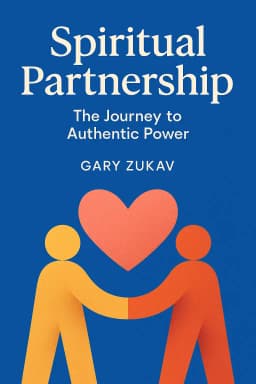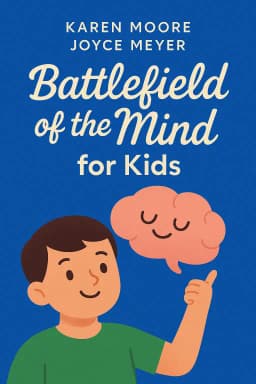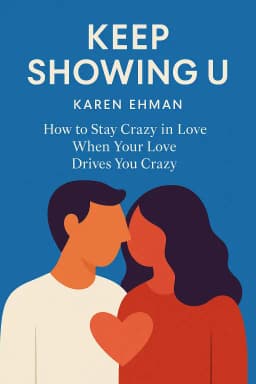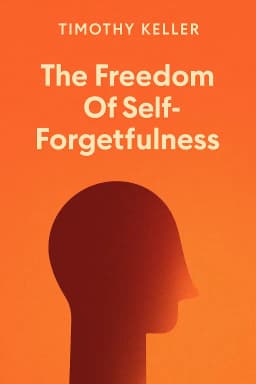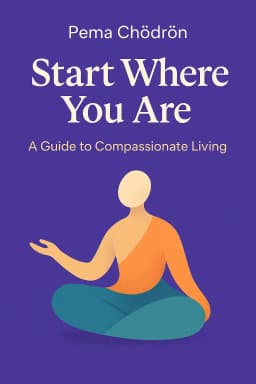
Your Brain on God
Golden Hook & Introduction
SECTION
Daniel: A recent national survey found that nearly half of all Americans believe in a God that is cold, critical, and harsh. What's wild is that neuroscience suggests holding that belief might actually be damaging your brain. Sophia: Whoa, hold on. Damaging your brain? That sounds intense. That’s not something you hear in Sunday school. Where is this coming from? Daniel: It comes from a fascinating and, for some, controversial field where brain scans meet belief. We're diving into the book How God Changes Your Brain by neuroscientist Dr. Andrew Newberg and therapist Mark Robert Waldman. Sophia: Okay, a neuroscientist and a therapist. That’s a potent combination. So this isn't just philosophy, they're actually looking at the physical hardware of the brain. Daniel: Exactly. Newberg is a pioneer in this. He’s one of the first researchers to put people into brain scanners—we’re talking Tibetan monks, Franciscan nuns, experienced meditators—to see what’s physically happening in their heads during moments of intense prayer or spiritual connection. Sophia: I love that. It’s taking something that feels so mystical and subjective and trying to map it. So, what did they find? Does the brain just light up like a Christmas tree when someone thinks about God? Daniel: It’s much more specific and, honestly, more profound than that. The core idea they present is that your beliefs aren't just abstract thoughts floating in the ether. They are physical forces. They quote, "If you contemplate God long enough, something surprising happens in the brain... God becomes neurologically real." Sophia: ‘Neurologically real.’ That’s a heavy phrase. It sounds cool, but what does it actually look like in practice? Can you show me the proof? I need a story, Daniel. Daniel: I have the perfect one. It’s one of the most compelling studies in the book, and it has nothing to do with religion, which makes it even more powerful.
The Brain's Malleable Spirituality: The Story of Gus
SECTION
Daniel: The story is about a man named Gus. It’s the summer of 2006, and Newberg’s team at the University of Pennsylvania is studying people with memory problems. Gus is an industrial mechanic, a regular guy, and his memory is starting to fail him. He's worried, so he signs up for the study. Sophia: Okay, so he’s not a monk or a spiritual guru. He’s just a guy trying to keep his cognitive edge. I can relate to that. Daniel: Precisely. He has no prior meditation experience. The researchers give him a series of cognitive tests and a baseline brain scan to see where he’s at. Then, they teach him a specific, 12-minute meditation technique called Kirtan Kriya. Sophia: Kirtan Kriya. What does that actually involve? Is it just sitting in a quiet room and humming? Daniel: It's a bit more structured than that, but it's simple. It involves a specific breathing pattern, repeating a simple mantra of sounds—Saa, Taa, Naa, Maa—and touching your thumb to each of your other fingers in sequence as you say each sound. Sophia: Huh. Sounds, breathing, and finger movements. It’s a multi-sensory exercise. So this isn't about believing in anything specific for Gus, right? He's just doing these... mental exercises? Daniel: That’s the crucial part. The practice is stripped of its spiritual or religious context. For Gus, it’s just a daily 12-minute task. He does this every day for eight weeks. Then he comes back for another round of tests and another brain scan. Sophia: Alright, the moment of truth. What happened? Did this little 12-minute routine actually do anything? Daniel: It did more than anything. Gus himself reported that he enjoyed it and felt better. But the objective data was staggering. On a test called the Trails Test, which measures cognitive function, Gus showed almost a 50 percent improvement. Sophia: Fifty percent? In eight weeks? From 12 minutes a day? That's not a small change. That’s a life-altering improvement. Daniel: It’s massive. And the brain scans showed why. There was a significant increase in neural activity in his prefrontal cortex, the part of the brain right behind your forehead responsible for focus, planning, and attention. And, importantly, there was also more activity in his anterior cingulate cortex. Sophia: Okay, you’ve mentioned that term before. Anterior cingulate cortex. Break that down for me. Why should I care about that specific part of the brain? Daniel: Think of it as the brain's empathy and emotional regulation hub. It helps you tune into others' feelings, it helps you feel compassion, and it helps you manage your own emotional responses. When this area is strong, you're more socially aware and less reactive to stress. The meditation was essentially a workout for Gus’s attention and empathy muscles. Sophia: Wow. So it’s like a high-intensity interval training workout, but for your brain's most sophisticated functions. It makes the idea of neuroplasticity—the brain changing itself—so concrete. It’s not just a theory; you can see the results on a scan and in a person's life. Daniel: Exactly. And it proves one of the book's key quotes: "Spiritual practices, even when stripped of religious beliefs, enhance the neural functioning of the brain in ways that improve physical and emotional health." Gus is the living embodiment of that. He didn't need to find God; he just needed to do the work, and his brain responded by healing itself. Sophia: That’s incredibly hopeful. It suggests we have more agency over our own brain health than we think. But it also raises a big question for me. If the practice itself is so powerful, how much does the content of our thoughts matter? Daniel: That is the perfect question. And it brings us right back to that startling idea from the beginning—that your image of God can either be a powerful ally or a destructive force in this process.
The Neurological Spectrum of God: A Benevolent or Authoritarian Brain?
SECTION
Daniel: The power to change the brain is a double-edged sword. The authors argue that what you focus on during contemplation or prayer is incredibly important. Sophia: Okay, let's get into it. You mentioned that survey at the top of the show, the one about how Americans see God. Lay it on me. What did they find? Daniel: It was a large, nationally representative survey conducted by sociologists at Baylor University. They wanted to figure out what qualities Americans associate with God, and they found people's views clustered into four distinct "personalities." Sophia: Four personalities of God. That alone is a wild concept. What are they? Daniel: First, there's the "Authoritarian God," who is highly involved in the world and also highly judgmental. About 32% of Americans see God this way. Then there's the "Benevolent God," who is also highly involved, but is non-judgmental and loving. That’s about 23%. Sophia: Okay, so more people believe in a tough-love, authoritarian figure than a purely loving one. That’s already surprising. What are the other two? Daniel: The third is the "Critical God," who is judgmental but not very involved in the world—sort of a celestial critic watching from the sidelines. That’s about 16%. And finally, there's the "Distant God," who is neither involved nor judgmental—more like a cosmic force or first cause. That’s about 24%. Sophia: Let me get this straight. If you add up the Authoritarian and Critical God believers, you get 48%—nearly half the country. That's the number you started with. Almost half of Americans envision a God who is, to some degree, angry or judgmental. That's... unsettling. Daniel: It is. And the authors of How God Changes Your Brain argue this has real, measurable neurological consequences. When you regularly contemplate an authoritarian or critical God, you are repeatedly activating the brain's fear and anger centers, particularly in the limbic system. Sophia: The limbic system... that's the more primal, reactive part of the brain, right? The fight-or-flight response? Daniel: Exactly. It's the part that's great for dodging a predator but terrible for nuanced thinking and social connection. The book argues that chronic activation of these circuits through fear-based belief can lead to increased anxiety, stress, and intolerance of others. It can literally prime your brain for conflict. Sophia: And on the flip side, what happens in the brain of someone contemplating that "Benevolent God"? Daniel: That's where it gets really interesting. Contemplating a loving, compassionate God does the opposite. It strengthens the frontal lobes and that all-important anterior cingulate cortex—the very same areas that lit up in Gus's brain. It builds up the neural pathways for empathy, social awareness, and emotional regulation. Sophia: So you're literally building a more compassionate brain. It’s a choice between a workout for your fear circuits or a workout for your empathy circuits. Daniel: That's a perfect way to put it. The book makes a powerful case that the most recently evolved parts of our brain, the parts that make us uniquely human, are the ones responsible for empathy and social awareness. And these are the very parts that are strengthened by positive, compassionate spiritual practice. Sophia: This is fascinating, but I have to ask the skeptical question here. Some critics of the book have pointed out that a lot of this data about belief systems comes from these large, online surveys, which aren't always the most scientifically controlled environments. How do the authors square that with the hard brain-scan science from the lab? Daniel: That's a very fair point, and one the authors are aware of. They don't present the survey data as having the same kind of controlled rigor as a lab experiment. They see the two types of evidence as complementary, painting a picture at different resolutions. Sophia: What do you mean by different resolutions? Daniel: The brain scans are like a microscope. They show us in high-definition detail what is happening in the neural circuits of one person during one specific practice. It’s the micro-level mechanism. The surveys are like a telescope. They give us a wide-angle view of how these different belief patterns and their associated emotions—like fear or compassion—are distributed across an entire population. Sophia: I see. So the scans show the 'how' and the surveys suggest the 'what' on a bigger scale. One shows the tool, the other shows how people are using it out in the world. Daniel: Precisely. The scans prove the brain can be changed. The surveys suggest that the dominant ways we think about God in our culture might be pushing many of us toward the fear-based side of that equation, rather than the compassion-based one.
Synthesis & Takeaways
SECTION
Sophia: Okay, so let me try to wrap my head around this. On one hand, the book reveals we have this incredible, built-in tool for brain health. Practices like meditation or prayer, even when totally secular, can physically rewire our brains to improve memory, focus, and empathy. That's the story of Gus. Daniel: Right. It's a universal human capacity. Sophia: But on the other hand, there's a huge catch. The content of that contemplation—the kind of God, or worldview, or even internal monologue we focus on—acts as the instruction manual for that rewiring process. And it seems a lot of people are unintentionally using an instruction manual that builds up fear, anger, and division. Daniel: That's the core tension of the entire book. And it leads to their ultimate message, which isn't just a simple "God is good for you." It's far more profound. The real takeaway is that your brain is constantly, physically listening to your beliefs. It is actively rewiring itself, second by second, based on the story you tell it. Sophia: That feels like an immense responsibility. Daniel: It is! But it's also an immense opportunity. Whether you're an atheist meditating on the concept of universal compassion, or a devout believer praying to a loving God, you are an active participant in your own neurological evolution. The authors even point out that contemplating other grand themes, like the Big Bang or evolution, can also change your brain for the better. The key is the focus and the positive emotional tone. Sophia: So the fundamental choice isn't about which religion to follow, or whether to believe at all. It’s about what kind of neural circuits you want to build. Daniel: Exactly. Are you building circuits of empathy, compassion, and connection? Or are you reinforcing circuits of fear, anger, and judgment? The book puts that choice squarely in our hands, not as a matter of faith, but as a matter of neurological hygiene. Sophia: It makes you want to do a quick audit of your own internal monologue. What are the dominant thoughts you're feeding your brain each day? Are they building you up or breaking you down? Daniel: A great question to reflect on. And a powerful place to start. The authors even include practical exercises, like something they call "Compassionate Communication," designed to do just that in under 15 minutes. Sophia: It’s empowering to think that small, consistent practices can lead to such significant changes. It’s not about some massive, overnight transformation. It’s about the quiet, daily work of shaping your own mind. Daniel: That's the heart of it. Faith, in the end, isn't just about God. As the authors say, it's about "faith in ourselves and each other." That's what gives life meaning and drives us to transcend. Sophia: A powerful thought to end on. We'd love to hear what our listeners think. Does this idea of a neurological God resonate with your own experiences? Let us know on our social channels. Daniel: We're always curious to hear your stories. Sophia: This is Aibrary, signing off.
